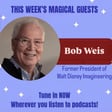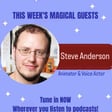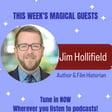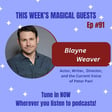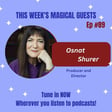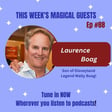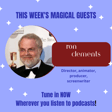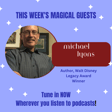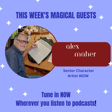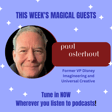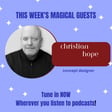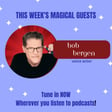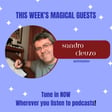Become a Creator today!Start creating today - Share your story with the world!
Start for free
00:00:00
00:00:01

Episode 83: Frans Vischer
On this week's episode we sit down with animator Frans Vischer!
For more on Frans check out his website HERE
DISCLAIMER: We are not an affiliate of the Walt Disney Company nor do we speak for the brand or the company. Any and all Disney-owned audio, characters, and likenesses are their property and theirs alone.
Recommended
Transcript
Podcast Introduction
00:00:01
Speaker
Welcome to Sharing the Magic, the podcast that takes you on a journey through the enchanting worlds of Disney. Each week, we're joined by a special guest, whether they're a magician creating moments of astonishment or a Disney expert sharing the secrets behind the magic of the happiest place on Earth. Together we'll uncover the stories, inspirations, and behind-the-scenes tales that bring these worlds to life.
00:00:32
Speaker
So, get ready to be spellbound and transported to a place where dreams come true.
00:00:54
Speaker
Hello and welcome
Meet the Hosts and Storytelling Focus
00:00:55
Speaker
to the latest episode Sharing the Magic. I'm your host, Barry, and tonight we have another fantastic episode and another amazing guest that we're going bringing to you Before we jump into all the amazing stories that we're going to hear from our guests, let's hear from our goofy co-hosts tonight. So first of all, we're going to say hi to Brandon. Brandon, how you doing tonight?
00:01:17
Speaker
Nice to see everybody's faces, you know, hear some good voices tonight, too. You know, it's it's all ah it's all something good to hear about people's story and and learn more about the storytelling aspect of, you know, not just Disney, but, you know, someone's career. So can't wait to get started.
00:01:33
Speaker
Absolutely. All right. Next up, we have Chrissy. Chrissy, are you doing? Good. Glad to be here. Very excited to um hear the stories that our guest has to share behind his wonderful, beautiful illustrations.
00:01:49
Speaker
All right. Next, we have Dawn. Dawn, are you doing tonight? Hi, from Houston, Texas. Welcome. And I love your backdrop. um Just love the Golden Gate. i love San Francisco, but beautiful picture um for those of you that can't see it. And welcome to the show and look forward to hearing your story. Yeah, good.
00:02:10
Speaker
Although I am in Los Angeles. I'm not in San Francisco, but I do love the city. all right. Next, we have Lisa. Lisa, how are you doing tonight? Hi everyone. i'm happy to be here.
00:02:22
Speaker
Just made it right in time to get started. Very excited to hear from our featured guest tonight. i was ah searching all of the amazing things that he's worked on in the past and there is quite a list. We should be all over the board tonight. So we'd be here.
00:02:42
Speaker
yeah If you think rabbit holing and all the other episodes was a big one, you're going to love this episode. all right, next up we have Josh, how are you doing tonight? I am pretty pumped. I got stuck in the rabbit hole of storyboards today, just on on the website, just scrolling, scrolling. just I'm not an artist. I stink at art. So I was really amazed at how intricate these storyboards are, man.
00:03:08
Speaker
So I'm excited to be here. Daylight Savings Time has my daughter up and running around right now. so Oh, right. I hope not ah to be blessed by a little T-Rex here soon, but I'm excited.
00:03:21
Speaker
All
Franz Vischer's Disney Journey Begins
00:03:22
Speaker
right. And last but not least, the Goofy Doop himself. Jeff, Jeff, how you doing? I'm doing good. I'm excited for this here episode. And i'm ah I'm an amateur voice guy, and I study the heck out of Bill Farmer and Goofy, who I just love. And and i do a few I do a few others, but but a i have this phrase. just think it just popped in my head as Goofy. So, war I'm happy to see you.
00:03:50
Speaker
franz vischer we're going rabbit holen land overboard and yeah rabbit rabbit rabbit oh my pleasure all right yes and our guest as you heard from goofy himself is franz vischer and franz welcome to sharing the magic yeah thank you for having me i'm i'm happy to be here All right. And if you heard our podcast before, i ask the same question every single week, and I'll ask you, Franz.
00:04:27
Speaker
So tell us ah how you fell in love with Disney. Let's see. I have a long-winded answer. i try to keep short. But I was born in Holland, and I never got to see an animated film until we moved to the States when I was 11. My parents never went to the theater, to the movies.
00:04:45
Speaker
So I did see Mary Poppins in Holland. And I just love to draw, and I would and i drew from Donald Duck Magazine and, and you know, love Disney in that way.
00:04:56
Speaker
They rarely showed animation on TV, ah so it wasn't until we came to the States that I suddenly was blown away how many TV channels there were and, you know, The Wonderful World of Disney...
00:05:08
Speaker
And then back in those days, of course, you didn't have home video. They would reissue the the classics every seven years. So for me, it was catch-up time. And I would just you know catch them all when they when when they were re re released.
00:05:24
Speaker
But yeah, just the drawing and the whole fantasy of it and and just just going into a whole different world um just just drew me in. And, you know, I'm in school. I was a great daydreamer and, you know, which annoyed my teachers. But yeah, I ah just love Disney. And then when I was 13, without telling me, my so we moved to the Bay Area, ah Cupertino, actually,
00:05:52
Speaker
And my mom, without telling me, sent some of my drawings to the Disney studio in Burbank. And um how she even got the address, I don't know. um but they wrote back and invited us to come visit whenever we were in Southern California. so So we did the following summer. We did
First Visit to Disney Studios
00:06:10
Speaker
a whole vacation, you know, Disneyland Universal Studios. And and for me, the the kicker was the Disney studio. And it It was a much smaller place back then, not the conglomerate that it is today. And i was there, my whole family were there, all six of us. And we got to just walk around and look at the back lot. I met animators and... um
00:06:36
Speaker
And they encouraged me to make my own films on Super 8 film. And so that started, I mean, I love Disney already, but but actually animating and being able to do it at home. My dad bought a used camera and built a little light box for me. And I just started animating without knowing how and just just learning as I went.
00:06:57
Speaker
Yeah. but But yeah, that visit to Disney was was amazing. And I came back a few few times on my own, showing my portfolio. And, you know, eventually my first job was at Disney. So ah yeah, that's that story.
00:07:16
Speaker
How old were you when you may have already said that? forgive me if if you already mentioned it. But how old are were you when your mom sent in Oh, I was 13. 13. Wow. So, yeah, i still had a, you know, I still had a Dutch accent. i i didn't speak any English coming here.
00:07:33
Speaker
But, yeah, it was it was such a kick to get to meet some of the animators. I didn't get to meet any of the greats until later. Milt Call, I think, was still there. god it would have been grand to have met him. But...
00:07:46
Speaker
Later on, I did when I started at Disney, eventually, so I went to CalArts before that, and the the school, which Walt Disney founded, but then I started a de ta training program that Eric Larson ran.
00:08:02
Speaker
And so for, i don't know, four five months, and boy, that was super. And then Years later, i got to meet Frank and Ollie. That was great. I saw Mark Davis speak. I didn't get to meet him. He came to CalArts as well. Basically trashed our stuff.
00:08:20
Speaker
but But now it's it's so it's great. And and then, yeah, after my third year at CalArts, each year you make a film and they have a producer show at the end of each year.
00:08:35
Speaker
And they offered me a job after my third year, and I took it. And so so I had the training program with Eric Larson, and then i was then I started working on Mickey's Christmas Carol. So that was my my first production.
00:08:50
Speaker
So he just won my heart with that. oh my gosh. Oh, it was great. I lost my breath on that a little bit. i was like Oh, why did I? How did I skip that when I was looking over? oh well, I was an assistant on it. So I, you know, basically starting at the bottom.
00:09:06
Speaker
And I worked by the animator i worked with was Randy Cartwright. Yeah, Randy Cartwright. He was one of he and Glenn Keane were the top two animators at the studio. and And it was great. He you know gave me little bits of, you know, secondary animation to do or whatever, but kind of taught me as we were going along. And it was great.
00:09:26
Speaker
So he's a good guy. i'd like to like him a lot. what a great place to start and what a good place to sort of look back on. and Yeah. hold Well, especially that, that when I, when I started the Cal arts and I finally, you know, found people like myself, you know, the, who, who got my, my weird sense of humor and whatever, and, and love to draw, love to, you know, wanted to work at Disney and all that. But we also thought we were 40 years past, uh,
00:09:56
Speaker
the golden age and was there any future? I mean, the the only place doing quality animation was Disney. there There was a lot of TV animation going on, but we all thought, you know, is this a dying art? And, and you know, did we miss the boat 40 years ago?
00:10:12
Speaker
And there ended up being this whole new golden era.
Disney Culture and Animator Influences
00:10:16
Speaker
So we've we've I've been immensely fortunate. ah So this has been going through my head. You're not the only animator we had on there, but for everyone who goes to Cal arts, what, I mean, you know, you go in there, you're bringing your, your stuff in.
00:10:31
Speaker
What is what is the rate of people who actually, um, when, when Disney looks, how many people are they actually looking to promote into positions?
00:10:43
Speaker
It's positioned for that. Right. and And, you know, obviously there's no set number. It depends on on the needs. It's a high number, though. We know that from... So, yeah, CalArts. And, you know, it was interesting, too, that before I got there, there there was a it was a real divided place. You had um I'm sure you guys know about the whole Don Bluth.
00:11:04
Speaker
Yes. There and afterwards. but some But some of our listeners might not. So feel free to elaborate if you. OK, so inclined. So, yeah, yeah. So, um so Don Bluth started his own studio and right before I, so I started at Disney and, and there was a real deep, you know, there were two factions basically you had the, the, or three actually he had the old guard at Disney and basically the leftovers from all the stars,
00:11:35
Speaker
who had ah either died or or retired. And then you had the Don Bluth crowd, who and and Don Bluth, I think, was was in a lot of ways really in love with movement for the sake of movement. yeah and and and to to be an honest to say it That's a good way to say it. So, yeah, yeah I think a lot of their stuff is over animated.
00:11:58
Speaker
you know, I've never heard of that. I mean, yeah, i i' I'm generally not a big fan. So to be honest, but and then you had the third group was the Cal Arts group who really wanted to shake things up. And, and you know, I remember Jerry Reese, a good friend of mine who who was ahead of me at Cal Arts. Oh, I know Jerry. We know Jerry.
00:12:19
Speaker
Oh, he's a great guy. I love that guy. Yeah, he's wonderful. Great dimples, you know. so I know, yeah. yeah And I remember him telling me how they all went when when Star Wars came out, the the the original one, and they were all leaving the theater and he said, God, I wish we were making movies. And then he said, oh yeah, we are.
00:12:39
Speaker
But they felt so old farty what they were doing at the time, you know, and those guys really wanted to do new stuff, you know, and ah he, ah ah Jerry and Brad Bird tried to do ah the spirit and which I would have loved to have worked on. I was ready to move back up to Northern California for that.
00:12:57
Speaker
But anyway, so the there were, yeah, a lot of people that were kind of antagonizing each other in those those camps. and And it was not a great atmosphere at Disney. And then finally, Don Bluth started at his own studio to make his own film. And I liked the first one, The Rats of Nym, lot, actually.
00:13:17
Speaker
But that left a big hole. and And so they started bringing in more people from CalArts. And so I certainly benefited from that. Yeah, and they've continued doing that. and And Disney certainly has been changed for that. I mean, very much modernized.
00:13:35
Speaker
I mean, even the films prior to me starting there, um you know, there was always great animation, but there were not great films. You know, The Aristocats, Robin Hood, you know, and and I'm not going to trash Disney, but it definitely needed new life. And and I think CalArts really supplied that.
00:13:53
Speaker
and And ever since, too. I mean, they've people, you know, from Canada, from Sheridan College, Art Center in Pasadena, where I coincidentally now teach. So there's a lot of people from from all over the world, really, coming to Disney, which is great.
00:14:11
Speaker
So when when when you came when you came to, um you know, when you came over from Holland and not knowing, you know, English and things like that, ah how long were you drawing all your life? So did you have, like, your drawings do the talking when you when you came over?
00:14:29
Speaker
Yeah. In fact, I have ah a great story. I tell this a lot, too. Like, I visit, you know, schools, and mostly ah younger kids four for my for the books that I do.
00:14:43
Speaker
And um my very first day in school, it was we came in February 1970, so a long time ago. And um ah but in but it was in the middle of the school year. I don't know why our parents didn't wait till summer. And and they had us ah ah they had us listen to these god awful tapes every night at dinner, these audio tapes to learn English. And I never i think I never took the whole thing seriously. i was really just you know kind of suppressed it. And none of it. I have two brothers and a sister and none of us wanted to to move and leave our friends and and everything.
00:15:19
Speaker
so So I never learned a thing coming to um of English. and And then our parents just one day, you know, when we got a little settled, they all just brought us to school and they just left me. And and I was horribly shy. And here, um of course, I was the center of attention and and I hated it.
00:15:37
Speaker
And the worst part, this is the story that I tell when I visit schools, is I didn't know how to tell the teacher I had to go to the bathroom. and um And I tried to explain and he didn't get it. And then the whole class got involved, which only made me more uptight and and you know shy and whatnot. And anyway, this went on for ah number of minutes as I tried to explain. And I finally, out of sheer you know ah frustration, I drew a kid on the toilet and I gave my drawing to the teacher and I assumed he would quietly lead me to the bathroom. Instead, he shared my drawing with the whole class.
00:16:15
Speaker
I got a big laugh. And so that was my first day in school in America. so and then I realized that, okay, this is how I communicate. So by drawing. so So yeah, I was doing it all the time. Well, that's really good to know. I mean, I like that because that's, hey, at least you were able to draw and say, hey, yeah this is what I need.
00:16:36
Speaker
yeah So I don't know if I'm jumping too far ahead, but, you know, is there ah like a moment in the career where you felt like you were in like a real life cartoon? Oh, boy. That's funny. I have that often, actually.
00:16:49
Speaker
ah Just situations, you know, I love watching people. And, yeah, I've had times, you know, where it's like I'm carrying too much stuff.
00:17:01
Speaker
and And I realized, you know, this is stupid. I should have, you know, I shouldn't have taken so much or whatever. And I'm, you know, slipping around or trying to balance things. and And I feel like goofy or something, you know.
00:17:13
Speaker
um But yeah, there's a lot of situations where I think this feels like a scene in a movie, either live action or animation. And the thing is, so I teach now part-time at Art Center in Pasadena, and I tell my students that to observe, you know, there's there's a wealth of information, and not information, entertainment around you, you know.
00:17:35
Speaker
And so I always keep a sketchbook with me, and and I just, I love watching people, just even everyday mundane stuff, but it's, it's, it is such sheer entertainment people that, you know, they get pissed off at each other or people in love or whatever situation, a parent with a child that's, you know, and, and they become little story ideas that one day I'll use.
00:18:01
Speaker
Pran said, goofy has like, Oh, you know, okay. Slips on a banana peel and he's sort of, who wow you know, Eddie, but he sort of sometimes lands back on his feet.
00:18:13
Speaker
you know, and that's, that's goofy. Sometimes life is, uh, yeah. And I guess what do they call falling upward as they say, you know? Yeah. Yeah. But I got to animate him, or or not animate, I guess in between him on in Mickey's Christmas Carol, and I have on a number of other occasions since.
00:18:32
Speaker
Oh, man, that's that's close to my heart. I love that. I get starstruck. oh so dot when like oh i know I bet I could, i if you describe the scene you animated, I guarantee I would say, I know that scene! And i would then I'd be like, oh...
00:18:47
Speaker
Well, that and then I get starstruck because it's like, that's the person that brought that thing to life. And then I just, oh, of course, then I get I get really starstruck. So, all right, I'm starstruck. OK, I'm going to.
00:19:00
Speaker
Well, thank you. Well, I feel like I live in a cartoon on the regular, but I can't animate it. and So I have a nice glass of wine when that occurs. but But um I wanted to jump ahead a little bit, and this is probably way ahead, but I'm obsessed with Princess and the Frog, and i wanted I know I've learned from other animators that there's a side of the storyboard. There's more than one person that draws one character, which that was news to me.
00:19:29
Speaker
yeah. What are some other things like that that are kind of, I don't know, little tips? And then what are some Easter eggs in the movie that you maybe saw? And then did you think the three, I'm sorry, am my three questions here, ever think that it would be um a ride or that the ride would be turned into that or that it would be such a big hit like it is?
00:19:51
Speaker
Yeah, yeah. No, I, it was really fun to to animate on that. So your your first question, they they try to cast, you know, ah supervising animators, and and which I wasn't on that film. um I had been away for Disney. I've come and gone. I've left, like, I think four separate times.
00:20:12
Speaker
and And so I came back on that, and but I was not a supervising animator on it. Bruce Smith was on Dr. Facilier, which I worked on. But they basically try to cast, I mean, you know, they they say, I'm sure you guys heard, animators are are actors with a pencil, or nowadays with a stylus. And um they try to cast people on a character that really...
00:20:35
Speaker
fits there the way they animate, but also their their acting styles. you know Some people, some animators prefer more serious, dramatic stuff, more subtle stuff. Others like the more broader, humorous, whatever.
00:20:49
Speaker
um And then you have ah a crew of people that you work with. And depending on how big of a role the character has in a film, you know that ah determines the size of your crew.
00:21:01
Speaker
and And then you have a whole ah whole team of of the cleanup artists, they're called, and so they follow up the animator's rough drawings. So there you can you know there's whole crew of people that work on that one character.
00:21:16
Speaker
And before the the Easter egg one, was kind of fun that that the two directors, John Musker and Ron Clements, I was showing them a scene that I'd animated, and they said they were they were starting work on the the Mardi Gras sequence.
00:21:35
Speaker
And Ron Clements asked me to do a caricature of them, which I did, and and as characters in the parade. And then they had let me animate them. so And then I ended up putting myself in there as well. hell So that was really cool. I've never had that before. And and they do that often in their films, Ron and John. so And they're they're great people. they're They're wonderful. They were really fun to work with.
00:21:59
Speaker
Let's see. there were I think I answered two, and I'm forgetting the third one. The last one is, did you think it would become a ride? Oh, right. and but Yeah. Out of all the movies that are created, there aren't that many characters that we see in the park, and Tiana is one of them. Yeah. Obviously, that big hit, and then they changed the ride. So did you ever think that that would happen?
00:22:19
Speaker
No. No. And I mean, because i mean there there really aren't that many rides at Disneyland, so... Yeah, I think that's really cool. and And, you know, you feel quite honored by it. So, yeah.
00:22:33
Speaker
And I think, too, at the time, I mean, it's it's I think it was a bit risky for Disney to do. I think it was great that they had an African-American, you know, main character. But, yeah, that was that was a little risky for them. And, they know, my hat's off to them for it.
00:22:49
Speaker
I know Josh has, too. Josh you can't stay here though the entire time. He's got some things to do. He may. Oh, you're good. I'm going to turn it over to you, my friend. no that's cool, man. Yeah, because I actually have a question about something you said.
00:23:02
Speaker
ah You mentioned that you left Disney on four separate occasions. And yeah these guys may know this, but I have no idea. i mean, are illustrators hired like on a project-based kind
Animator Career Dynamics
00:23:13
Speaker
of thing? Or are they more permanent gigs? Or how does that work? Yeah, at ah Disney, and it's really animators, but there's there's a whole group. i mean, illustrators more, know, like character designers whatever.
00:23:25
Speaker
But, I mean, just artists in general, they they generally keep them on. Disney and DreamWorks and Pixar... generally do that. and But then, you know, they also hire people simply to help finish up a film. You know, you get the crunch time the last three, four, five months.
00:23:44
Speaker
But their general thing is to keep people on. um It's just that i i generally, if there's a really cool project somewhere else going on, then you know, it depends what's what's next at the studio that I'm at.
00:23:59
Speaker
But I, yeah, I I feel like, um you know, yeah, i I want to work on a variety of projects. So I leave and go work there. So I you know can't say I guess I'm terribly loyal in that respect. But um I want to do a variety of stuff. And it's it's it's good working with different people as well.
00:24:20
Speaker
Awesome. And i had I had one more thing. And then this is just, these are like selfish questions for me. So i'm just I'm just generally curious about two main things. That and like the technology-based questions for animation.
00:24:32
Speaker
um You know, I'm not an artist, so I think like pen, pencil, paper is like the easiest, quickest way to sketch something out. um What's your favorite way to animate? And then what is, like, what's the new age thing to do?
Digital vs Traditional Animation
00:24:47
Speaker
is it still the same? Yeah. Well, I think the thinking is still the same. but And I did learn computer animation, well, somewhat. But i'd it it frustrated me. Like like most traditional animators, you know you want to draw, and it's so much quicker to just scribble out a drawing.
00:25:06
Speaker
but um And I have nothing against CG. you know there There's beautiful stuff being done at Pixar and all the studios now. But yeah, I just rather draw. and But I love to draw digitally now. ive I started storyboarding many years ago, drawing on the computer screen.
00:25:25
Speaker
and And then i worked on um ah Paper Yeah. paperman yeah and you got yeah You know the the black and white short Disney film?
00:25:36
Speaker
so um So I worked on that, and that kind of opened my eyes to animating digitally, and and I love doing it. And so I use Toon Boom Harmony. yeah and Oh, you do? use use that? That's it? That's cool.
00:25:50
Speaker
Yeah, yeah, that's wonderful. So I do, I storyboard on it. haven't storyboarded in a while, actually. But yeah, yeah Storyboard Pro is also from Toon Boom. Oh, cool. And I love drawing digitally. and And I sketch, you know, my own stuff. I really don't draw much on paper anymore.
00:26:07
Speaker
And the thing that I love about it, especially animating, is that... There's so little spontaneity in in traditional animation or animation in general, CG as well. It's all planned out and it's so much work to do all the things that that you do that it's all mapped out in advance. And, you know, the whole point is you want to bring the character to life and make it look like they're breathing and and not all, you know, everything pre-decided and it just going through the motions.
00:26:37
Speaker
But when you're doing it digitally, you can come up, if you come up for, and you know, you do plan out your shots you as you should. But then ah sometimes if you get an idea out of the blue, you can just scribble it out and time it out and and play it right then and there, you know, and and if it doesn't work, you toss it.
00:26:58
Speaker
And if it does, you incorporate it and you know you then you go over the drawings. And just like in Photoshop, you can lower the opacity of the layer that's right and start a new layer, draw over it and and you know clean it up and really put drawing into it.
00:27:12
Speaker
And um so it it I think it just opens up a whole world kind of of editing. And you can you can retime stuff so quickly. And, yeah, I just love it. And then there's a number of animators. I know, I remember Andreas Deja telling me that, you know, it's got to be on paper. it'ss It's not traditional animation if it's not on paper. And I think, I don't really care. As long as I'm drawing, I'm i'm good.
00:27:38
Speaker
But I think it just, the things you can do with a computer is phenomenal. And I wish, it's really disappointing Disney's not taking advantage of that because the the technology just allows you to do so much stuff.
00:27:52
Speaker
and And I do think, again, I don't want to knock CG, but a lot of it looks quite alike. Yeah. yeah and but what what ah What out there that, from traditional, that digital you know can't really replace?
00:28:08
Speaker
Is there anything? All of it. Well, i think I think just the, especially the design part, and that you can do, i don't know if you want to call them cheats, you know but a character can... um You can just morph them. You you can you can stretch them. and And you can do a lot of that in CG as well. But really taking the yeah advantage of the flat design, that it is ultimately on a flat screen, and and that you can you can play with the line work. you can You can do texture stuff so easy in traditional animation now.
00:28:45
Speaker
that um and And I just think, you you know, it it is an artist actually drawing it as opposed to, ah you know, a puppet in the screen that's manipulated.
00:28:56
Speaker
yeah So the puppet is always going to look exactly the same as opposed to traditional animation. No matter how much, the you know, all the the artists try to draw the character on model the way they're supposed to look, you still have an individual's touch of how that person interprets that character.
00:29:15
Speaker
This is okay i guess this is big. And here's why. I'm like, I'm geeking out because, you know, we would I've I'm an amateur artist, amateur. Okay. I wanted to be a syndicated cartoonist. All that's all I want to do growing up.
00:29:28
Speaker
And I used to read comic strips. I spent hours and hours. So I got, I'm not great. I'm not, I'm not, I'm very amateur. but I know enough about animation and and drawing and I, I work with software now, even just for fun. And I don't, you know, to tell you if I, I always say this, if I had this software, if I had a tablet when I was 10 years old, yeah boy, I would be, ah and all the tutorials on YouTube and art boy, just what?
00:29:59
Speaker
And I know kids today, god they're lucky. they're Lucky and but here's the thing there needs to be ah a 2d renaissance a brand new 2d renaissance and I think we have all I think what you said was affirming in that you know we what you see is You know flashy I say flash animation, but that's sort of what it was you know when when 2d are it's like well here's it's like I'm There's no shading. There's no heart to it. it just it It looks and feels mechanical, and it is mechanical.
00:30:29
Speaker
But then, you know, you have you know CG, which feels more organic. It feels fun, but it's not. It's still... it's not out So there needs to be a And now we have all the technology in the world to reproduce the beauty, the splendor that used to take years in animation for two d And we like we have it all, but yeah sort of like think nobody wants do it ah Yeah, and you can do it far less expensively as well. Well, why not? You know, and that's that's my question. I'm like, well, why don't we have those beautiful, you know, Hunchback a Notre Dame. I remember when I saw that movie, I was like, you know, for the first time, the just the the the colors, the lighting.
00:31:16
Speaker
Boy, we can we can do all that stuff now on ah on a buck. And camera moves, too. I mean, yeah i you guys probably read about, you know, the the days way back, you know, like Bambi, some of those insane camera moves they did and the work it took.
00:31:32
Speaker
And now it is so easy with a computer to do, you know, and to change and whatnot. Yeah. You know, I mean, those guys would spend hours and hours. And once they start one of these difficult shots, they can't break for lunch or whatever. And, and you know, or if somebody screws up, they go, oh, we'll fix it later. It's like, right you start the whole damn thing all over. All over again. Yeah.
00:31:56
Speaker
Franz, I love how you bring classical sensibilities, but you're not afraid to go. I like the. i From animators, you don't hear that very often to say, hey, I like the new stuff. I'm i'm open. And oh you have an open minded mindset. And you're like, hey, I like all this, but you have the skill set already.
00:32:16
Speaker
So if there was a new and so but let's let's pretend what, you know, there's a there's an animator listening now or somebody that would love to. And they're looking into the future and they're thinking, boy,
00:32:27
Speaker
You know, I want to have I don't want to just live in a tablet. What if we have the apocalypse, you know, and there's no more tablets. There's no more computers. There's nothing like that. And you are just you've got to. It's just pen and paper. And, you know, you got your Strathmore bristle board and some heads and some some, pen you know, whatever it is. And.
00:32:50
Speaker
How do you balance between the two? Okay, there's new technology, but but bringing in where you don't give up the past. You you honor it. you You learn sort of, but how do you yeah Is there a both and?
00:33:05
Speaker
Well, yeah, I mean, i think the principles apply just as much then as as it does today. and I do wish more, um well, more. i know i know a a lot of CG animators that don't draw, and i that, I think, is really strange. And they have directors, but you know, at some of the studios, too, that that don't draw. And I think, really?
00:33:29
Speaker
This is a visual medium. And, you know, you don't have to be, you don't all have to be a master at it. But anyway, so the principles apply just as much, you know, to CG as as it does to traditional animation.
00:33:44
Speaker
And then, you know, what's changed is is the storytelling, you know, the types of stories and whatnot. And even there, at at the root, you know, storytelling is universal. You know, somebody across the world can understand human emotion ah just as, you know, as as we do here.
00:34:03
Speaker
yeah So um I think just the types of stories that are being told have changed. And I think that's great. But yeah, the the principles of of connecting with an audience, you know, ah characters who maybe at the start are not appealing, but ultimately, you know, you got to connect in some way with an audience that that type thing will never ah change.
00:34:26
Speaker
Right. Okay. So, Barry, I'm going to go back to you in a second. going to ask one question. Then, Barry, you shoot it to – we got Lisa and we got Chrissy. and But um you' you've mentioned story a lot. And one thing around here we say is story – I say it. I'm not saying we. I say it. Sometimes other people say it.
00:34:44
Speaker
It makes me feel good when they say it, but it's story shapes, whole story shapes life. So when you think of and animation, doesn't have to be Disney, but top, top two stories that you think are the best stories in animation.
Favorite Animated Stories
00:35:00
Speaker
And, and I love that. I love you you're like, yeah, the animation, like you went, you talked earlier about Don Bluth and how, boy, the animation was good, but the stories matter. And sometimes the stories aren't good. The animation's great. But it's sometimes the stories are amazing and the animation's not so good either. But, but boy, story can really pull, you know. it could Yeah.
00:35:20
Speaker
It can really... So what are your top maybe two desert island animations? You know, there'll be a ah ah helicopter that flies and it drops down an old VHS, you know, like Oh man, that is tough. VCR.
00:35:37
Speaker
And then you'll have two movies that'll fly down, animated. Yeah. What would be those two? Yeah, from the old, i I'd certainly have to say Pinocchio would be one. And then, you know, picking a newer one, boy, that is tough.
00:35:54
Speaker
I didn't tell you to pick a new one. No, I know. I know. But um i don't know. I love Brad Bird's films. um Yeah. You know, The the Incredibles, maybe. Yeah, those are great. And, oh, and and Toy Story 2, mean, as well.
00:36:12
Speaker
i mean, yeah, either one or two I mean, so, yeah, that that is tough. But I love most of the the Pixar films. I'm not crazy but that they're doing a lot of sequels now since Disney bought them.
00:36:25
Speaker
Right. But, I mean, two films, boy, that is tough because I love Bambi. I love Honor 1 Dalmatians, too. That one's good. Yeah. So, and the design elements. Yeah. ah Real quick aside, the guy who the color stylist of that, 101 Dominations, Walt sta not stanford well Paraguay, he was wonderful. And I got to sit next to him. I worked at Marvel for a time after I'd left Disney the first time. And and i actually sat next to him for six months. And I just soaked up all these stories for him. It was amazing.
00:37:01
Speaker
But anyway, yeah, I can't name just two. No, and that's that was the point of the question. It was... impact I thought those were just wonderful answers. they were Those are just perfect. They were great answers, of course. i yeah All right.
00:37:16
Speaker
it'll be It'll keep you up. but Those are the questions I'll keep you up at night. Yeah, there's a lot of great film. know. Sorry to do that to you, my friend. don You would really think about it if you were on a desert island, because that'd be like, oh, what two movies would want? You'll be like, you, Jeff. You'll be cursing my name. I only get two, and it'll be like a little sheet that, like, what would you want? you're like, oh, And I forgot to mention who framed Roger Rabbit, which isn't technically, you know, just a film.
00:37:46
Speaker
But I was, yeah. and And man, am I fortunate to have worked on that. Good old Gary Wolf. We've interviewed him He's a, Oh yeah. We are. Yeah. He's a, I love that man. And he's.
00:37:57
Speaker
I mean, the creative. Yeah. um Usually during the podcast, this is the time where I get on my soapbox about about about movies, but I'm not going to do that tonight because have a big issue. Lisa and we have Chrissy too. chrisy too yes i have ah have a biggest show about Disney movies from the 80s. But my question for you is, you know, you mentioned working on Who Framed Roger Rabbit and it just seemed like it was a perfect, perfect time to ask this.
Working on 'Who Framed Roger Rabbit'
00:38:28
Speaker
Tell us about your time there. And like Jeff to mentioned, we had Gary Wolf on here. And i think I think a lot of times people struggle because of the non Disney of that movie.
00:38:42
Speaker
And, you know, you get Warner Brothers characters in there as well and things like that. So tell us about the time working on that on that film. yeah um Yeah, I definitely had more ah more a more adult sensibility to it.
00:38:57
Speaker
um And I remember reading the script, and it was hilarious, which is is rare, you know, oftentimes in for animated features since the you know the days of when Walt Disney was alive is, you know, you start with a script, and it oftentimes isn't all that great. And then you you know you make it great during the storyboard phase.
00:39:20
Speaker
And, you know, you you mold the characters and the story and all that. But, yeah, that wasn't the case with Who Framed Roger Abbott. And then the whole concept with the moving camera and and that's the, you know, the live action director, Robert Zemeckis, was allowed to just shoot a live action movie. And I remember thinking, that's insane. Yeah.
00:39:42
Speaker
they're They're out of their minds, you know. it Up till then, you always had the camera locked, and so the animator knew exactly where the character was within the within the screen. and And then I saw some finished footage, and it just blew my mind. And I thought, oh my God, I can't believe they're doing this. And now I get it And so, and then the first few shots I got, this this was my first time to animate at at the Disney studio. Before, i I had animated professionally, but, you know, when i left Disney the first time, i wasn't an animator.
00:40:18
Speaker
And so so like this was my time to test myself you know to work on a Disney film as an animator. And boy, there it was tricky. And and you know nowadays, with the technology, again, it's so much easier to combine live action with animation.
00:40:33
Speaker
um But you had to, you were given shots where the camera's moving and you you you got photostats, black and white photostats with the peg holes so you could match with your paper.
00:40:45
Speaker
And then if the camera's moving, you had to find little guideposts to to guide you. So whether it's like an an oil spot on, you know, on the on on ah on the pavement that was moving this way because the camera is moving that way.
00:41:01
Speaker
And you had to, you know, so you would trace these little things in in the live action setting and plot your character there. And so your first pass On animating, you're you're hardly animating. You're really just placing your character. And and if the camera is zooming out, then you have to draw your character getting smaller.
00:41:20
Speaker
And so, you know, it was really just kind of plotting the character. And once you got a ah general sense of the the ah the perspective and the changing angles, then you could start your acting or whatever the action that the shot required.
00:41:37
Speaker
But yeah, that was exciting stuff. And we knew, you know, that we were doing something revolutionary. And then the whole sensibility of it um and of of combining the all these classic characters.
00:41:51
Speaker
Yeah, it was really cool. And Bob Zemeckis really wanted, he pushed us to to do do broader stuff, you know, to not be tied down by the legacy of Disney.
00:42:02
Speaker
That's to do to really just go and and find new ways to do things and and really think of it as an adult film. Yeah. That's amazing. All right, k Chrissy. Chrissy, I'd hate to just right off the bat, but I just want to make sure you get your...
00:42:17
Speaker
Oh, no. I mean, all of my questions have been answered. how Oh, that's beautiful. So, I mean, it's it's been amazing. i mean i I'm soaking it all in. you're You're just not only amazing illustrator, but you're also an amazing storyteller.
00:42:31
Speaker
But one thing that we had discussed before um you came on the podcast was just how your illustrations tell a story in and of themselves. Oh, yeah. When we were looking at your website and whatnot, your illustrations are just so rich. They they tell a story in and of themselves. Thank you. um They're just beautiful, just stunning. and And I noticed on your website, it says that you also illustrate children's books.
00:42:57
Speaker
Yeah. And right. I'm straying off the Disney path. No, you can't go for it. Go. Do you do you write the children's books as well or do you just simply illustrate them? And how how is the illustrating of the books? How is that different than, you you know, animating the films?
00:43:17
Speaker
Yeah. OK, yeah, it's a good question. I'll tell you um let me back off a little bit, ah back up rather a little bit. Do you guys know Joe Ramft? You know that name at all?
00:43:28
Speaker
know. He was a I know. i i didnt Oh, OK. He was a classmate of mine at at Cal Arts. And I remember seeing his stuff. Yeah, I'm going to ramble on a little bit with my answer, but we'll go for it because our you we have listeners, right? So they want to hear it. So, you know, it doesn't matter. though know who would it yeah Yeah. Tell us the story. Tell us. so He was technically he was not a great draftsman. and And and I remember looking at his stuff at school and and then later on at Disney as well. And and I really had to learn and appreciate how important story is, even though we were we heard that and then.
00:44:05
Speaker
So for me, it's like I wanted to animate and and kind of the stuff that I i accuse ah Don Bluth of, half the time I didn't care what what I had to animate. I just wanted to animate and and move things around.
00:44:18
Speaker
And, you know, even though intellectually I understood that, yes, story is important, and it took me years to really, really grasp that. But Joe Ramft, our second year...
00:44:32
Speaker
i I had a film that I i was really happy with, and and they had told us, you know, don't think you know the don't think of telling a grand story, okay? Storytelling is important, but make it a simple situation.
00:44:45
Speaker
And that's another part of storytelling is to, you know, there's ah somebody receiving this. You've got to entertain them. You've got to connect with them. And you also need to be concise and and clear and, know, all these things that the great Disney films have, you know, the visual clarity, but also what the characters are doing, what, you know, what is their bigger goal, ah the the overall story point.
00:45:10
Speaker
And um anyway, and so Joe did a film our sophomore year that was really short. I think it was only like 90 seconds, maybe two minutes. And of course, in it in terms of animation, that's a hell of a lot of work.
00:45:24
Speaker
But my film was was five and a half minutes long. And I thought I really nailed it. I loved it. and and And I thought, you know, they're going to love this and whatever. So at the end of the school year, they have they have their annual producer show.
00:45:38
Speaker
and And I had the misfortune of having my film follow Joe's. they They edit them all together, just one giant thing. And and these poor producers sat through... most of these films that were incredibly boring and they just sat there, you know, especially the silent freshman year films.
00:45:56
Speaker
In sophomore year, you got to do sound. Anyway, Joe's film, and I, you know, the animation was was fairly crude, the drawing is crude, but it communicated like like gangbusters, and it was funny as hell.
00:46:10
Speaker
And people were laughing and laughing and and And it ended with a bang and they're just laughing and blah, blah, blah. and And then they had like 15 seconds of of blank leader in between each film.
00:46:22
Speaker
And then my film started and people were still laughing from Joe's and and chuckling. And then that gradually died down and it stayed down for five and a half long minutes. And I realized I did not make such a great film.
00:46:35
Speaker
And I was just dying just as my film just went on and on and slow. And and it wasn't that funny. And I basically just wanted to dig a hole and bury myself in it. And and I learned a really powerful lesson of how important storytelling is and communicating and doing something interesting on the screen, not just moving it beautifully around.
00:46:59
Speaker
And then Joe was hired by Disney, and I went back for my third year, and I did get hired the next year. But even then, um seeing his his drawings, his storyboards, I would look at him, and I would analyze him, and I would think, you know, like I would picture a Glenn Keane drawing, and I'd say, God, you know, Glenn is so much better Draftsman, da-da-da.
00:47:20
Speaker
And still me not grasping what Joe was doing. And the thing is, you know, there were not... always pretty drawings, but they worked, know, they communicated. So I tell my students that now at at Art Center, that even though draftsmanship is important and I want you all to draw well and and learn like to draw hands well to communicate,
00:47:42
Speaker
But you got to make a point. And the story point ultimately is more important than a great drawing. You know, I so I'm constantly on them about doing drawing hands better. Oftentimes they they draw a circle for a hand.
00:47:56
Speaker
Somebody holding something. Hands are so hard. yeah yeah Yes, and they are. And i I struggled for years. I love drawing hands. But I tell them, too, you know, I've never been entertained by a well-drawn hand in a storyboard.
00:48:10
Speaker
You know, it's the the overall point you're making that matters. so and then So Joe ended up, he worked on Nightmare Before Christmas and then moved over to Pixar and became this this story guru there.
00:48:25
Speaker
and like He worked on all the films there instead of only one at a time. He would go from story meeting to story meeting and and screenings and whatnot and make his comments. and And then he tragically died quite young in a car accident. I mean, he was in his 40s.
00:48:42
Speaker
Horribly sad. But he
Storytelling in Animation and Influences
00:48:44
Speaker
and when he when he died, really the kind of the heart and the soul went out of of Pixar. So I think John Lasseter was, you know, he was the one that basically got the credit. And Joe really should have gotten a lot of that because and he was he did not he did not have a giant ego.
00:49:02
Speaker
He didn't have to have his name all over the place or or be interviewed all the time. But he was involved with all these great films. and really helped make pixar what it is today or or you know was for years thanks for sharing that i've i've never heard that story in it it's oh that's insightful because know part of what we want to do here we want to hear these stories because that's sharing the magic that's what it is you know we yeah yeah we interview so many wonderful people and part of it is preserving we we could just as easily i think be called preserving the magic and it's
00:49:37
Speaker
It's hearing stories. and But yeah that's what we want. We want to be a database of these stories. So for the years to come. and so I'll tell you, too. Oh, sorry. I cut you off there. You did not. No, you're just fine. all right All right. So, Chrissy, actually, to go on also you know talking about picture books.
00:49:59
Speaker
or or children's books, rather. There's also a part of that that where, as an animator, you know, you you and I love to animate, but the content of your shots are predetermined. You know, you can you can interpret it, you can have your character do little additional things. I mean, you can add to a shot, obviously. That's what ah ah an animator brings the stuff to life.
00:50:22
Speaker
But the story content is set. and And so I enjoy doing storyboards as well. But I've had it often, and and this is what kind of drove me to doing doing children's books, is working on a film where you know the story doesn't work.
00:50:39
Speaker
And yet they've got a production schedule and you're, you know, they have ah ah an army of of artists that needs to, you know, they don't want them sitting around not working. So they start on a film when it's not really ready to. And boy, is that frustrating to animate a shot that you know in your gut doesn't work.
00:50:59
Speaker
You know, and then that then basically you're just making pretty movements, but it's it's meaningless. And so and I've I've I've done a little directing and but I I don't know, I cannot. I've seen directors in meetings and dealing with executives and, you know, and and and and not all executives are idiots. But.
00:51:21
Speaker
but a good number of them are. And seeing, you know, they throw out some stupid idea and how the director just takes it with a straight face, and which I have a very hard time doing. i do not have a good poker face.
00:51:34
Speaker
And, you know, I roll my eyes without realizing it, and i you know I've ticked people off with that. So I know I would never make a good director on a big budget film because I i i would, you know, annoy people too much.
00:51:47
Speaker
So I saw for me, directing, ah doing children's books is my way of directing and having that control. And even, you know, directors in animation on big budget films do not have all that much, you know, control over their own stuff.
00:52:03
Speaker
So and ah and a Jonas book I can do by myself. So it took me years. And I there's a lot more that I've drawn up and written that I've not been able to get published. um and And I just keep plugging away at it.
00:52:16
Speaker
But but yeah, I love to to write. i' I discovered and and I've written some short stories before. just for fun and kind of inspired by Roald Dahl, you know, who did Charlie and the Chocolate Factory and Mr. Fox and whole great stuff. And um and so, yeah, i managed to get a book published, my first one called Jimmy Dabble, and and which is a long form. It's a middle grade novel.
00:52:43
Speaker
and And then it took me many years after that to get the next one published, which was inspired by my cat. We we used to have this gigantic Big fat cat. He weighed 28 pounds at his peak. And and ah he was great and and a character. And I would sketch him for fun. And I slowly came up with a story idea.
00:53:04
Speaker
and then I did two others. um and These were published by Simon & Schuster. And then, boy, I had a ball with that. Oh, and then I'm kind of going on with your question, Chrissy, but there is a big difference, and yet there's a lot of similarities between children's books, book illustrating, and and animation or storyboard.
00:53:25
Speaker
The thing, you know, in storyboards on film, you'll you learn screen direction, and you have to be consistent with that. And, you know, a character, if they're looking left-handedly, and then, you know, the they're they're they react to something and then you see their point of view.
00:53:41
Speaker
You can't cut back to them suddenly looking the other way because the thing they were looking at was to the other their other side. And so those things mean absolutely nothing in children's books. So my first pass on on the first Fuddles book, I was really consistent with that. and i And they said, no, let's put the tree over here. And I said, yeah, but on page three, the page was over there.
00:54:02
Speaker
And I said, oh, who cares? That means nothing. So things like that, I've had to kind of unlearn. And then things I wanted scope. I remember in the first Fuddles book where I wanted him to climb up and and Or he tried, rather. The point was that he couldn't climb because he was too heavy and whatnot. And he would he'd been pampered his whole life. so But I had to say, if the image was this big, I wanted this gigantic tree and then fuddles like this small next to it, which basically said, you know, this is like a mountain to climb for him.
00:54:34
Speaker
and But they said, you know, he's the center point of the book and he's this small in the image. And I'd say, well, yeah, that's to show that tiny cat, huge tree.
00:54:45
Speaker
And they go, no, he needs to be bigger. and So I had to really struggle with how do i you know how do i graphically show that this is a big tree while making the cat big within the within the image. So there's a lot of things that are different and and other things are are similar.
00:55:02
Speaker
And you, you know, you, you have to, instead of, uh, I'm used to, as an animator doing, you know, all sorts of different poses and you have to narrow it down and just do one pose that states something clearly.
00:55:16
Speaker
it is. no it is No, it's not. well late and And the the question of the night goes to Chrissy for sure. What do you think, Barry? That was a great question. Yeah, go ahead. Looking at, you know, animators, you think that they're only down to one thing, but when you can get an animator who also can write, can also write and also create their own characters to where they're doing it on their own, I think that's special.
00:55:42
Speaker
Yeah. All right, Lisa, are you ready to go? want you to know. So I've had many questions, um but I've enjoyed listening quite a lot.
00:55:54
Speaker
One of my questions was the um about the difference between working with different groups. Let's say Disney versus Warner Brothers versus Marvel versus whomever.
00:56:07
Speaker
The way that everyone does business might be a little bit different, but but how are places the same and how are places different? Boy, yeah, that's ah that's a tough one.
00:56:18
Speaker
I told you we're going to rubberneck you all the way. Yeah, yeah. yeah Well, certainly some places have have better budgets. that That's for starters, and that's tricky. And yet there's something to be said for using your noggin, you know, come up with a creative way to to to make something work when you don't have the budget for it. Yeah.
00:56:42
Speaker
But yeah, different styles. DreamWorks started off where they didn't have the the history, but you could also say see it as the baggage of Disney. you know they they They could do whatever they wanted to, and there's you know nobody to say that. you know That's not a Disney-style film.
00:57:00
Speaker
you know and and And finding different ways of doing things. um some Some places use technology more than others. But but then, you know, people move around a lot like like I have done. And and so it's it's I can't say that I wish there was more of a a style like there used to be that, you know, you had Disney doing stuff. You had the Warner Brothers, the the Looney Tunes cartoon that really had their own look.
00:57:29
Speaker
You do have this year, you know, the the Academy Awards that that were last weekend. um You had The Wild Robot, and which didn't win.
00:57:40
Speaker
I love that movie. I saw it in the theater. same Good for you. yeah yeah I love it too. and And I'm in the Academy, actually, and I voted for it, and it didn't win.
00:57:51
Speaker
um But i I love the film Flo as well, the one that did win. um And there too, that's ah it's a great example talking about budgets because that clearly, that did not have a big budget. And I think the characters look great when they're when they're a little ways from the the the camera and and just wonderful camera movement and the the fact that there's no dialogue.
00:58:13
Speaker
The only time is when they come up you close to the camera and you can see suddenly it looks like they're made of Lego pieces. Instead of, you know, there's there's no fur, they didn't have the budget for that. and And I wish they had a bit more of it. But still, you know, that didn't diminish the the storytelling or the impact of the film.
00:58:32
Speaker
Yeah, I don't know if that answers your question. but But, you know, it some of it is the way the leaders work. You know, you work with different directors and they have their own style, their own way of working.
00:58:44
Speaker
Some, you know, let you just go about doing your thing and kind of figuring things out. Others are very heavy on you know hands-on and want a certain thing. So I think that's the the main difference.
00:58:58
Speaker
I answered perfectly. Thank you. Okay, you're welcome. Yeah, Franz, I think one of the the big things is, and you hit it on the head, is that you look at movies and you can most of the time tell the quality of the movie just you know in the first five to ten seconds of it because you have movies out there... um You know, one movie that always comes to my mind was the movie Flushed Away.
00:59:25
Speaker
And it was always, you you could tell it wasn't a Disney movie. And it was like, it was sad because you you hit that head. I think storytelling is a big issue. And um a lot of times when you have a movie, the the quality, you worked on Frozen. So so you you would know. Princeton and the Frog.
00:59:45
Speaker
The storytelling on those movies were phenomenal. And you could tell, i think the animators, I think they rise above when the storytelling is a lot better.
00:59:56
Speaker
Absolutely, yeah. it's Like I said earlier, it's incredibly frustrating when it's not. But yeah, you know when you the way it's supposed to work that way, that each facet of production, whether it's CG or or traditional,
01:00:11
Speaker
you know, is each facet is each each area is meant to plus the preceding one. So, you know, you have storyboards and where the strength of the story really comes through and, you know, and then staging.
01:00:23
Speaker
But then you get layouts that really make the backgrounds work and and the cutting and the staging. ah improving it from the storyboards. Then you go to rough animation, and that's where the characters come to life.
01:00:36
Speaker
And then you get clean up where they're you know the the the drawing is solidified and and and with clean lines, and it's sharp and and more exact than the the rough animation was. Then you get color, and then you know yeah the backgrounds are painted, and then you get music, and each step changes.
01:00:53
Speaker
is intended to improve, you know, the proceeding. And if you start off with ah with a poor story, you know, it is frustrating and and and it's really difficult to be up for it when you know, deep down, this isn't working and it's, you know, yeah you end up not liking the film and you can't do your best work when you don't believe in it.
01:01:17
Speaker
My mind is so full every time. I just feel like i just feel like every time we have an episode, i feel like a pinata, and I just need to go just just think about it.
01:01:29
Speaker
So um before we wrap it up here, i just want to let you have the opportunity to talk a little bit about your website, serving your social media and things like that. You can talk about some of your books and and that so we can get some people to either follow you or get some of your items.
01:01:46
Speaker
So my my website is simply my name, Franz Vischer at, I mean, franzvischer.com. So F-R-A-N-S-V-I-S-C-H-E-R.com.
01:01:59
Speaker
And within there, I have illustration and animation and storyboards and whatnot. And I also have a blog basically on the fuddles. It's called Pampered Fat Cat.
01:02:10
Speaker
so ah And um I haven't been as good lately. I'm so busy. But i i've i for years, I was blogging twice twice a week, and either a cartoon or I would write something or whatever.
01:02:26
Speaker
But that's really fun. And it's it started off with fuddles. Now it really is just whatever I draw. I think recently i posted some stuff I did at Art Center, you know drawing along with my my students.
01:02:38
Speaker
And, yeah, so i'm I'm on Facebook and Instagram and whatnot, but I'm i'm not as regular as I'd like to be. i just, yeah, this time just, boy, just just zips by all the time. It's getting worse, too. Yeah.
01:02:55
Speaker
Yeah, and I'm working on a graphic novel that, um and and I'm only doing so much until I get a publisher for it, but that too. It's like, I know with my my schedule, if i if a publisher today said, okay, you know, we yes if I signed a contract, we're going to publish this, it would take me two years to finish it easily.
01:03:17
Speaker
So, yeah, time is tricky. When I think of your career and what you've done, I go, thank you. No, you've done ah from 13 years old. you have your your story goes harkens back to some people discover it later in life. You discovered it early.
01:03:38
Speaker
And ah well, thank you for that. And and I know you. You've worked on a lot of a lot of things that have have made a difference in the world. And and even when you know we turn on the we turn on a ah movie and we see your work, we and and we don't know it, but you're...
01:03:55
Speaker
You know, you've already, you have done the work. You found that destiny pretty freaking early. And that is awesome. And yeah and I'm, I'm very fortunate for that as well.
01:04:06
Speaker
And I have to say too, I mean, some of you, uh, our parents, uh, my my My parents have been, even though half the time they had they didn't understand what I did at all or why, but they were supportive, you know, and and I think we should do that, you know, the next generations. And I do that with with my my students at Art Center, too.
01:04:27
Speaker
um You know, you can you can be critical in a sense. I mean, don't lie to them that something isn't good and tell them this is great. But you can pick out the positives and and push them and always have them do better and support them to find, you know, yeah, who as you say, who they are, what yeah you know, what's really inside them and help bring that out.
01:04:49
Speaker
And what a great mom you had. but Yeah, she she was. Yeah. And it's funny because my my dad was a mechanical engineer. And so he drew with straights and exact you know dimensions and and angles and all that. And I was exactly the opposite. And and he would try to, you know, he he didn't understand me and I didn't understand him all that well. And my so my but my mom was definitely. Yeah.
01:05:15
Speaker
God bless her. Yeah. Yeah, and that's amazing. I really really wish you would have been able to keep your toilet picture because that was kind of the send off. People have asked me that, and yeah, I have no idea. whether I just sit there and like i'm I'm really kind of nervous how mine would have looked. It'd be like some stick figure thing, and they'd probably think...
01:05:38
Speaker
You know, and I mean, I mean, kudos to you, Franz. I think i think I think it's it's pretty amazing to see and why we have ah people like you come on here because everyone has a story. And and it's ah it's unfortunate that so many people know of the main the main people in play at Disney and things like that. They don't know the people underneath it. And that's exactly what we are here is to hear their story.
01:06:06
Speaker
because you guys are all woven into the Disney fabric and we are excited and thrilled to find out about that. Yeah. Yeah, and and with that, thank you all for listening, and thank France for coming on. it's It's been a thrill and an honor, and we have to have you come on again because but we haven't even touched Frozen.
01:06:30
Speaker
We haven't touched Winnie the Pooh either, and I can just see people going. Let it go, Barry. Let it go. We'll leave that for another time. For all you Winnie the Pooh fans, you're going to to join us again.
01:06:44
Speaker
And until next time, keep sharing the magic. Thank you for joining us for another enchanting episode of Sharing the Magic. We are the Thinking Fans Podcast, an edutainment show where education and entertainment collide each week.
01:06:57
Speaker
We bring you whimsical interviews with Disney guests who share their magical experiences and reveal how they are woven into the Disney fabric. Don't forget to hit that follow button to stay updated on our latest episodes.
01:07:09
Speaker
Spread the word and let your friends know they can tune in wherever they enjoy their favorite podcasts. You can also connect with us on Facebook, Instagram, TikTok, and X, formerly Twitter, at at sharing the magic pod.
01:07:23
Speaker
Until next time, keep sharing the magic.
